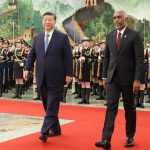“Why Bharat Matters” penned by the distinguished diplomat and current Minister of External Affairs, India, Dr S Jaishankar, is a compelling exploration of India’s role in the global landscape post-2014. The book comprehensively analyses India’s growing significance in a rapidly shifting global landscape, its contemporary challenges, and its international prospects. The author presents a concise and insightful analysis, drawing compelling parallels between classical Indian epics and contemporary international relations. In its chapters, the book touches upon India’s strategic cultural thought that has emerged from its history that spans thousands of years. Instances from the two great epics of Hinduism, the Ramayana and the Mahabharata, have been used to paint a picture of modern India’s strategic culture.
The book’s eloquent language clearly conveys India’s role in geopolitics, making it an immersive read. The book’s title aims to evoke pride in India’s accomplishments while promoting reflection on its challenges and aspirations. The author encourages readers to contemplate India’s role in shaping a more equitable and interconnected world.
Big things come in small packages. A mere 256-page book might not seem much, given the erudite nature of its author. And yet, the book encompasses 11 chapters that deal with many issues succinctly. In Chapter 1: Presenting a World View, the book paints a picture of India navigating the turbulent world as a “rising power”. Chapter 2: Foreign Policy and You presents a preliminary examination of the intricate relationship between Indian foreign policy and the lives of its citizens. Chapter 3: The State of the World widely analyses contemporary global affairs and their impact on India. Chapter 4: Back to the Future provides a complete and perceptive analysis of the current worldwide situation and explores various themes like the diminishing dominance of the USA, the rise of China, the emergence of “others”, and the evolving character of international politics.
Chapter 5: A Transformational Decade investigates the growth of the Indian foreign policy in the Modi era. Chapter 6: Making Friends, Influencing People provides an overview of India’s foreign policy in the 21st century, focusing on its relationships with major powers like the UK, Russia, France, and the West. Chapter 7: Quad: A Grouping Foretold provides an overview of the development of the Quad and its significance in the Indo-Pacific. Chapter 8: Dealing with China discusses India’s contrasting approaches towards China. The world is complex; miscalculations happen, and complacency is dangerous.
Chapter 9: Re-imagining Security and Chapter 10: The Roads Not Taken discuss the changing nature of security as traditional notions of security based on policing and military are insufficient today. Recognising and learning from diverse historical perspectives is necessary to address contemporary challenges. Chapter 11: Why Bharat Matters delves into India’s trajectory from independence to a self-confident and influential nation. Its democratic values, development goals, and innovative solutions offer inspiration and practical examples for other countries. India’s role in shaping the world order and addressing global challenges is increasingly significant.
The book’s strengths are its comprehensive scope, insightful analysis, and accessible prose. Overall, “Why Bharat Matters” is a must-read for anyone interested in India’s ascent into international politics and affairs post-2014. The book is highly recommended to students, academics, policymakers, and anyone seeking a deeper understanding of India’s growing global role. It serves as an invaluable primer for those grappling with the complexities of 21st-century geopolitics.
In conclusion, “Why Bharat Matters” is meticulously researched, insightfully analysed, and has an engaging narrative. The book is a testament to India’s enduring relevance and potential to shape a more prosperous and peaceful world.















